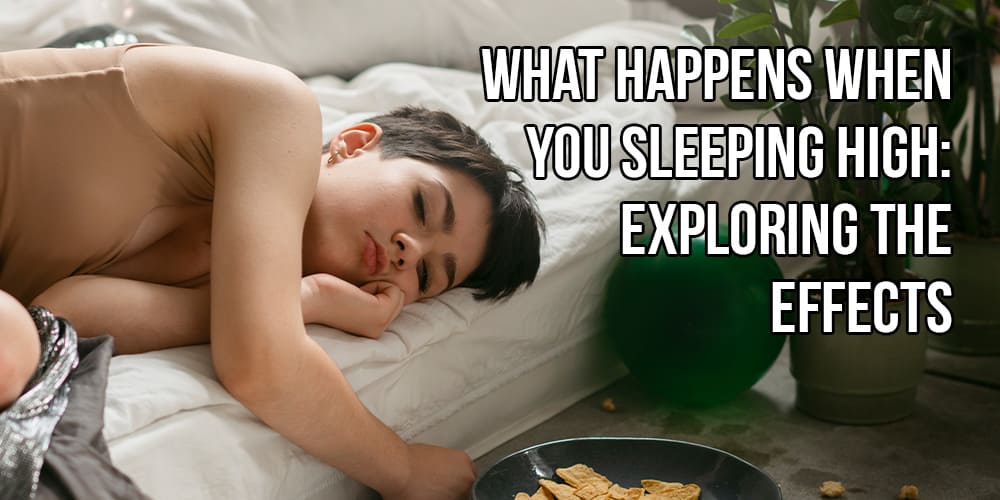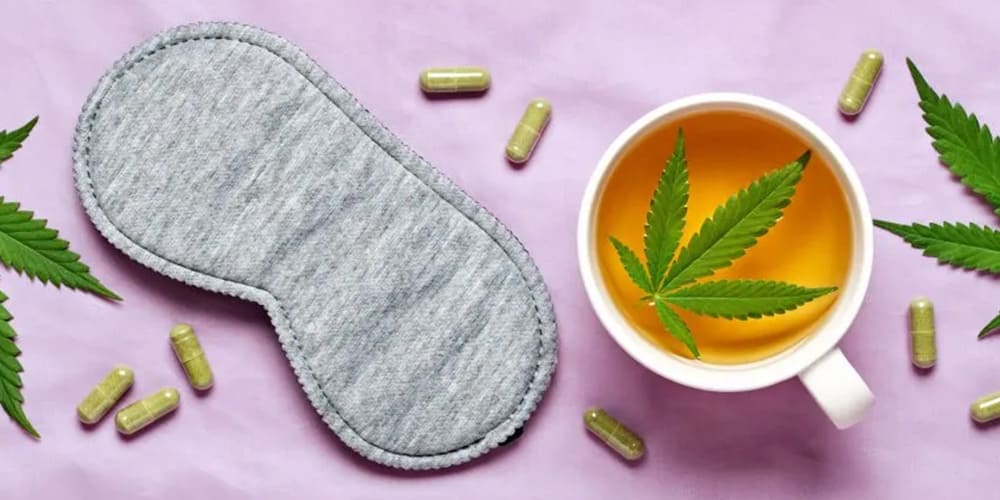What Happens When You Sleeping High: Exploring the Effects

Sleeping high and its relationship with cannabis has garnered increasing attention, particularly as more people turn to cannabis to enhance their sleep. This article delves into the intricate effects of cannabis on our sleep patterns, focusing on the experience and consequences of sleeping under the influence of cannabis. We explore how different strains and consumption methods can alter sleep quality, the impact on REM sleep, and the potential long-term effects on sleep health.
- Best Low THC Strains for Sleep in 2023
- The best indica strains for sleep
- Why Does Weed Affect People Differently?
Cannabis and Sleep

Cannabis contains a variety of compounds, with cannabinoids like tetrahydrocannabinol (THC) and cannabidiol (CBD) being the most prominent. THC is famous for its psychoactive properties, inducing feelings of euphoria and relaxation, which can influence sleep patterns in various ways. On the other hand, CBD, which is non-psychoactive, is known for its potential therapeutic benefits. It has been studied for its role in reducing anxiety and improving sleep quality, making it a subject of interest in sleep research.
Unlike THC, CBD does not induce a ‘high’, but it may impact the sleep-wake cycle and help in managing sleep disorders. The interaction of these cannabinoids with the body’s endocannabinoid system plays a crucial role in their effects on sleep. THC tends to bind with receptors in the brain that can alter the sleep architecture, particularly affecting the REM phase of sleep, which is associated with dreaming. This alteration can lead to changes in the sleep cycle and potentially affect the overall quality of sleep.
Meanwhile, CBD’s influence on sleep is thought to be more indirect, possibly involving its anti-anxiety and neuroprotective properties. Research continues to explore how CBD can contribute to sleep regulation, potentially offering an alternative to traditional sleep medications, especially for individuals with specific sleep disorders.
Indulge in the tantalizing flavors of Forbidden Fruit – Sauce Cart, a delectable fusion of Cherry Pie and Tangie. Our Forbidden Fruit Sauce Cart offers a luscious experience with its dense, purple-tinged buds, rich green leaves, and vibrant orange hairs. Savor the forbidden and elevate your senses with this exquisite blend.
THC and Sleep

THC, the main psychoactive component in cannabis, interacts with the brain’s endocannabinoid system, which plays a crucial role in regulating sleep among other physiological processes. High concentrations of THC can have a sedative effect, which seems beneficial for individuals dealing with insomnia. This ability of THC to induce drowsiness is especially attractive to those who have difficulty falling asleep, positioning cannabis as a potential sleep aid for some.
However, the relationship between THC and sleep is multifaceted and complex. While THC can help initiate sleep, it may also affect the quality and structure of sleep, particularly impacting the Rapid Eye Movement (REM) cycle. This can have implications for the restorative aspects of sleep, which are essential for overall health. For those considering cannabis as a sleep aid, it’s important to understand this intricate interaction and how it might influence their sleep patterns and quality.
Discover the intriguing allure of Mint Chip – Sauce Cart, a unique hybrid born from the union of SinMint Cookies and Green Ribbon BX. What sets this strain apart are its remarkable effects, providing a substantial mental boost while keeping you firmly grounded and functional.
CBD and sleep

CBD, a non-psychoactive component of cannabis, differs from THC in its approach to influencing sleep. It works indirectly by addressing underlying issues that disrupt sleep, such as anxiety and chronic pain. CBD is celebrated for its therapeutic properties, which can create conditions conducive to restful sleep. Instead of directly inducing sleep, CBD’s calming effects on the mind and body can ease the symptoms that often hinder the onset of sleep, such as stress or discomfort.
This nuanced role of CBD in sleep management positions it as a holistic alternative for improving sleep quality. By potentially alleviating anxiety and reducing pain, CBD helps foster a state of relaxation crucial for both initiating and maintaining a healthy sleep cycle. This contrasts with the direct sedative effects often associated with traditional sleep medications, making CBD an appealing option for those seeking a natural approach to better sleep.
The Stages of Sleep and Cannabis’s Impact

Sleep is a complex process comprising various stages, including light sleep, deep sleep, and Rapid Eye Movement (REM) sleep. Each stage plays a crucial role in overall health and wellbeing. THC, a key component in cannabis, is known to influence these stages, notably by reducing the duration of REM sleep. This reduction in REM sleep can lead to fewer dreams and nightmares, which might be beneficial for individuals suffering from PTSD, as it potentially diminishes the frequency and intensity of distressing dreams.
However, REM sleep is vital for cognitive and emotional processing, playing an essential role in memory consolidation and emotional regulation. Therefore, the impact of THC on REM sleep could have implications for these aspects of mental health. In addition to its effect on REM sleep, THC is also observed to increase the duration of deep sleep, which is considered the most restorative phase of the sleep cycle. Deep sleep is crucial for physical recovery, immune function, and overall physical health.
By increasing the time spent in deep sleep, THC may enhance the body’s ability to repair and rejuvenate itself. However, the alteration of the natural sleep cycle, particularly the reduction in REM sleep, raises questions about the long-term effects of THC on sleep quality and health.
Waking Up After Sleeping High

Waking up after sleeping under the influence of THC can result in diverse experiences, largely dependent on the individual’s response to cannabis and the amount consumed. Some people report feeling more rested and rejuvenated, which can be attributed to THC’s ability to increase the duration of deep sleep – the phase of sleep essential for physical restoration and recovery. This enhanced deep sleep can lead to a perception of improved sleep quality, as the body undergoes more thorough rest and repair.
On the other hand, a “weed hangover” is a common phenomenon experienced by some individuals after sleeping while high. This condition is characterized by residual grogginess, clouded thinking, and sometimes headaches or dry eyes. These symptoms may arise from the disruption of the natural sleep cycle, particularly the reduction in REM sleep, which is crucial for cognitive and emotional processing. Additionally, factors like dehydration or the method of cannabis consumption may influence the occurrence and severity of a weed hangover.
The experience underscores the complexity of cannabis’s effects on sleep, highlighting that while it may offer certain benefits, such as increased deep sleep, it can also lead to less desirable outcomes, impacting the overall quality of waking life.
Discover the perfect balance with our Durban Poison & Cafe Racer Hash Hole Pre-Roll. A 2.5g blend of uplifting energy and soothing earthiness, hand-rolled with a glass filter for the smoothest experience. Ideal for social and creative moments, it’s a taste and effect you’ll always remember.















